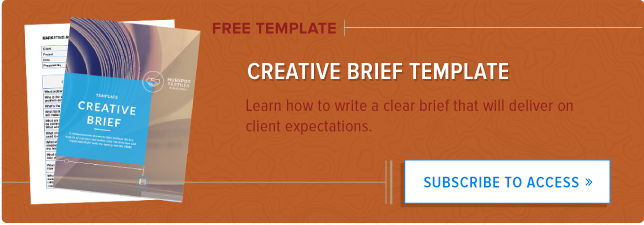

The best agency-client relationships are the result of collaboration, with the agency forming a deep understanding of the brand and its goals.
Now consider how spec work reimagines this phrase: The best agency-client relationships are the result of the agency quickly producing creative without insights into the brand's challenges and its audience, which the brand will use to judge if the agency is the right team to produce more work to solve its challenges and communicate with its audience. And the agency should do this for little to no compensation.
I'm guessing you know which one results in a better outcome.
Spec work has long been a point of controversy between agencies and clients. Beyond whether or not the practice is fair or ethical, it's a growing cost in an industry with shrinking margins. John Gleason of A Better View Consulting told Advertising Age that spec creative accounts for 1% of revenue (The average holding company profit margin was 12% in 2013.).
The practice of asking for spec work is getting worse, as companies try crowdsourcing and online design contests.
We wanted to know why agency executives think spec work is problem. Here's what they had to say:
It’s like picking a number between one and ten, guessing, and finding out the answer is a fraction.
Rarely are the spec ideas produced. Why? Because it’s an artificial process with guarded, minimal information and little collaboration.
Spec work is like playing the lottery.
- Patrick Scullin | Ames Scullin O’Haire
Spec work is a crap-shoot.
If you put enough time into truly understanding a brand, its challenges, and potential solutions, then you risk a hefty investment; if you don’t invest the time to draw informed conclusions, it is presumptuous to even venture to guess at viable solutions.
Unfortunately, it is becoming more and more common. Clients generally know their own brand and the industry far better than a prospective agency can even with a solid amount of time put towards the spec project. It is a pipe dream to think great work will come from a speculative creative exercise.
That said, great opportunities are worth whatever it takes to gain consideration. We do what we need to do in the service space to create meaningful relationships with good partners.
- Scott Watts | Tank Design
In written RFP responses, spec work is a waste of time. The reader may not have any context to what you are showing them. I also think when people ask it in an RFP they don’t understand how important developing creative is to us. It’s what we do. Asking us to just give it away means they already don’t respect you or what you do. To them, it’s like hiring somebody to provide them office supplies.
For in-person presentations, it’s your chance to show them how you think or how you arrived at your creative approach. 95% of whatever gets done in a spec creative pitch is tossed out because you don’t have the background or the relationship with the client to know what they really need, but it shows how you think and it shows them you want their business.
- Dennis Franczak | Fuseideas
In this day and age, spec work is just a necessary evil. It’s not the actual creating of the spec work that’s bad -- though any agency exec will bend your ear with the associated costs to the business. It’s the lack of clarity upfront on how it’s being used.
Creating the best work for the business involves so much more than just a bit of research and some amazing guess work. It takes experience with what’s worked for the brand, what consumers currently feel for the brand, and also avoiding major hurdles only known by those intimate to the business from the inside. Spec work should be used to see how an agency thinks and applies strategic insights to work. Spec work should be used to see the chemistry of the team presenting. Spec work should be used to see design and taste cues. But most importantly, spec work should be exactly that. SPEC. Buy an agency when you meet them for the first time -- not a campaign.
- Rachel Spiegelman | Pitch
The debate about spec work is like the debate about torture. We argue about whether it is 'good' or 'bad.' But we should look at it in a more cold-blooded way: Does it work?
Torture 'works' in the sense that you can get someone to say whatever you want. So if the mission is to hand over information -- useful or not -- to your superiors, then it will 'work.'
Spec 'works' in a similar way. But the mission is to win the account. So the agency will make whatever they think the client wants -- whether it’s informed, original, effective, or not.
Clients will continue to torture -- I mean 'ask for spec' -- from agencies. And while my firm usually passes on those 'opportunities,' I’m sure some tempting account will come along that will get us to do it again.
But all you clients should remember this: You can ask us to do it, just don’t expect it to work.
- Alec Beckett | Nail
There’s an old Woody Allen joke: A guy walks into a psychiatrist’s office and says, 'Doctor, my brother is crazy. He thinks he’s a chicken.' The doctor says, 'Why don’t you turn him in?' Then the guy says, 'I would, but I need the eggs.'
Ad agencies know that pitching with spec work is expensive, time-consuming, and given the limited time you get to spend with the client, a creative crapshoot. But we still do it for one simple reason: We need the eggs.
- David Bernstein | The Gate
The premise of spec work is logical -- clients want to get a sense for what an agency can do, and they want to take them for a test drive before they decide to make a purchase.
But as a point of general process, Deutsch tends to avoid those situations. While it gives us a chance to flex our creative muscles, it is a process usually done in isolation, and it's not reflective of how we work collaboratively with our clients.
We want to make sure we are doing all we can to give a client a good idea of what it’s like to partner with us, but we believe spec work isn’t always the best way to do it.
- Jeff White | Deutsch North America
I used to think spec work was bad, until we stopped doing it. Now, after four spec-free years, I think spec work is wonderful. 1) It saves time vetting prospects: When a marketer insists on spec work, they self-identify as someone who is a poor fit for our “flipped agency” business model. 2) It keeps our competitors off-balance: While we focus exclusively on producing results for our clients, competitors have the added distraction of performing free work for prospects. 3) It helps us differentiate: Prospects who seek a long-term relationship appreciate that our refusal to do spec work provides them with greater access to our best people.Initially, our decision to refuse spec work led to a dip in earnings. But soon, we began attracting a completely different type of client with projects that are more satisfying and profitable.
- Sean Duffy | Duffy Agency
Unless you have a deep insight into the category, the culture that informs it, and the particular business problem at hand, doing spec work is like throwing 'stuff' at the wall and hoping something sticks. If we’re in the business of solving problems, we need to know what that problem is before we start working on it. It also supposes that the way to solve the problem is through a piece of advertising, and that’s often not the case these days. It depends on how you see the role of advertising.
The pros: It demonstrates hunger and shows initiative -- perhaps. And it’s a great way of expressing your passion for a particular brand. My sense is that it’s more likely something smaller shops will do to get on the radar. If you think of spec work as a way of marketing the agency, then fine.
The cons: It’s an expensive way to get on the radar. I think it’s rare for spec work to end up running a client’s business.
- Shane Ginsberg/President | EVB
Let’s put this this way, is spec work bad for a doctor? Yes, it’s ridiculous. We are professionals, and we should always base our creative work on an analysis and strategy worked up in co-operation with the client and their target audience. We should not guess, and that’s what happens with spec work. We are here to solve problems, and we are not doing that if we start by creating ads we think are nice. It’s naturally OK to be proactive with an incumbent client, but every piece of work should start with a discussion and follow a defined process. So yes, spec work is bad. Furthermore, spec work that exists only to win awards -- that is not even published -- is not only bad, it’s illegal.
- Eka Ruola | hasan & partners
Ah spec work! To produce or not to produce? That is the age-old question. For the most part, spec work serves one of two purposes: The first, and perhaps the most obvious, is to sell an idea to a client. If you have the resources and the talent to pull it off and it’s on brand (know your client!), then I say go for it.
The other reason would be to keep artists and creatives inspired or to fill a void in your portfolio of work. It’s easy to get pigeonholed by a client, and the worst thing in the world is to be passed over for work that you know you can and would love to do just because it isn’t in your portfolio. Even if the work is not specific to a brand but rather a style, it’s more than possible that it can open the door to future opportunities.
- Jason Mayo | Click 3X
Spec work is rarely effective. You need a long term partnership to truly understand the clients business challenges, which I believe is a prerequisite for success.
- Ann Ystén | Perfect Fools










